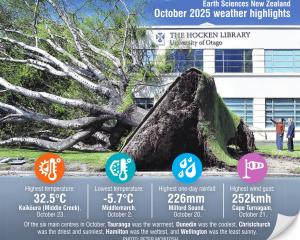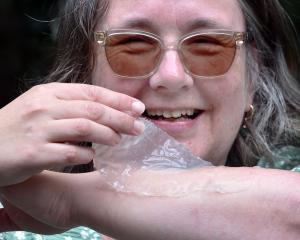
Four highly portable automated external defibrillators (AED) worth $1000 each were presented to the police by Waitaki Neighbourhood Support in conjunction with the Oamaru Licensing Trust.
The AEDs are a vital tool for those suffering a cardiac event.
Co-ordinator Christine Dorsey said the fact four rural police cars in the area were lacking AEDs came to light in May this year.
"The need for them was obvious, but police funds don’t extend that far," she said.
"So, as it meets the goal of improving safety and resilience, I set about applying for a grant through the Lions Foundation which is effectively the Oamaru Licensing Trust.
"They must have also seen the need as they quickly approved the funding, for which we are all very grateful."
Mrs Dorsey said the small units, called Cell AEDS, were compact for vehicle storage, and had a two-year life.
Licensing trust chairman Ali Brosnan said the AED idea was very worthy and fitted the trust’s mandate for the wider North and East Otago communities.
It had been pleased to approve the funding via the Lion Foundation.
"The Oamaru Licensing Trust is owned by the people . . . if you support the licensing trust you are supporting the local community," Mr Brosnan said.
Waitaki prevention officer Sergeant Blair Wilkinson noted the trust’s initiative fitted the location of the rural Omarama, Hampden, Palmerston, and Waikouaiti police centres. Kurow already had a patrol car AED.
To now have one in each of the other rural centres immediately extended sole charge police ability to give "a fighting chance" for those in their moment of crisis.
This was because they often arrived at an emergency before Hato Hone St John or Fire and Emergency New Zealand (Fenz).
"Often in the rural communities Fenz are called for these medical events.
"It may be that the police are aware and can hold the fort until they get there."
They were very grateful for the AEDs.
"The relationship between the Waitaki police and neighbourhood support is symbiotic.
"We’re thrilled to see the support is not limited to the Oamaru community but that the rural communities are being looked after, too."
Mrs Dorsey said she had recently heard of two instances first hand where people were alive due to an AED.
It made sense to help their main partner, the police, from where Neighbourhood Support began, she said.
Waitaki Neighbourhood Support now operated independently — with resilience and connection complementing safety.
Over 700 households were involved across the district.












